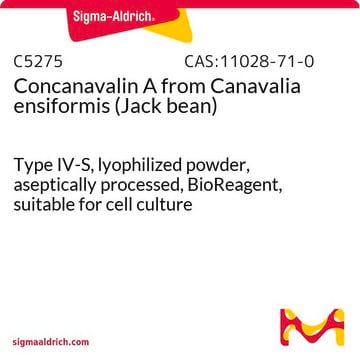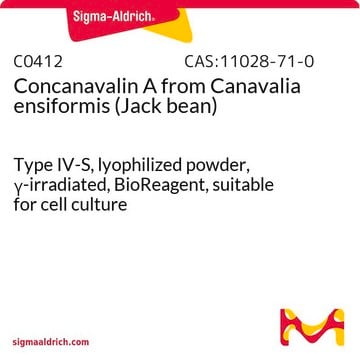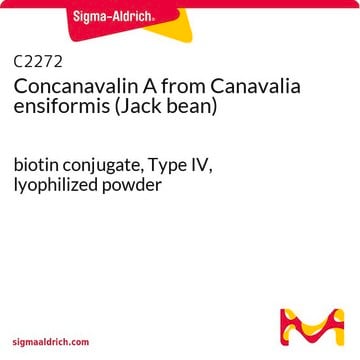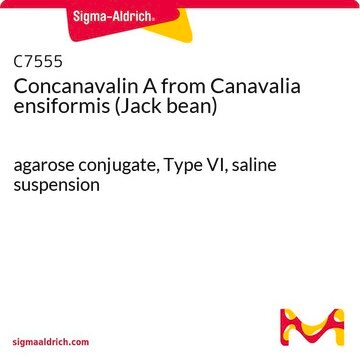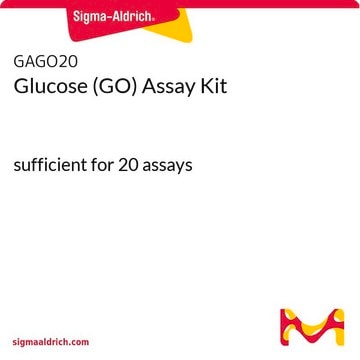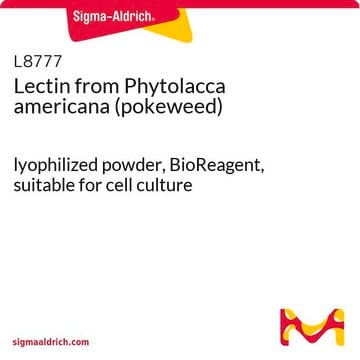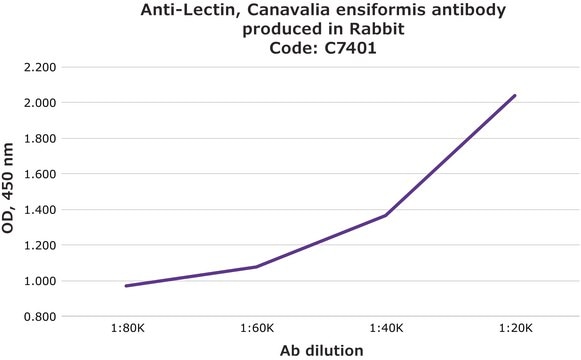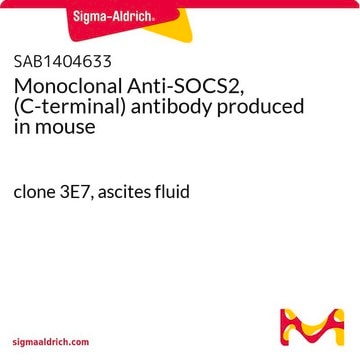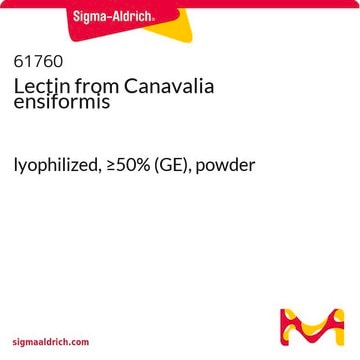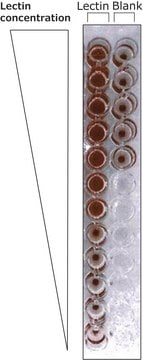C2010
Concanavalin A from Canavalia ensiformis (Jack bean)
Type IV, lyophilized powder
Synonym(s):
Con A
Sign Into View Organizational & Contract Pricing
All Photos(6)
About This Item
Recommended Products
type
Type IV
Quality Level
form
lyophilized powder
potency
<64 μg per mL agglutination activity
impurities
Carbohydrate, essentially free
salt, essentially free
storage temp.
−20°C
Looking for similar products? Visit Product Comparison Guide
Related Categories
General description
Concanavalin A (con A) is a plant lectin refined from jack beans. It is a tetrameric protein, which has four identical 28 kDa subunits. Con A has the ability to connect with the mannose residues of several glycoproteins and can stimulate lymphocytes.
Application
Concanavalin A from Canavalia ensiformis (Jack bean) has been used:
- as T-lymphocyte mitogen in lymphocyte proliferation assay for correlations with organochlorine contaminants (OCs)
- for in vitro stimulation of T cell hybridomas, BW5147 cells and primary CD4+ T cells for T cell vaccination and for induction of hepatitis
- for the stimulation of mice splenocytes in the suppression of T-lymphocytes proliferation assay
- for the stimulation of spleen in mitogen assays
Biochem/physiol Actions
Con A is not blood group specific but has an affinity for terminal α-D-mannosyl and α-D-glucosyl residues. Ca2+ and Mn2+ ions are required for activity. Con A dissociates into dimers at pH 5.6 or below. Between pH 5.8 and pH 7.0, Con A exists as a tetramer; above pH 7.0 higher aggregates are formed. Con A exhibits mitogenic activity which is dependent on its degree of aggregation. Succinylation results in an active dimeric form which remains a dimer above pH 5.6.
Quality
Highly purified by specific affinity chromatography
Analysis Note
Where reported, agglutination activity is expressed in μg/ml and is determined from serial dilutions in phosphate buffered saline, pH 6.8, containing Ca2+ and Mn2+ of a 1 mg per mL solution. This activity is the lowest concentration to agglutinate a 2% suspension of human erythrocytes after 1 hr incubation at 25 °C.
Signal Word
Danger
Hazard Statements
Precautionary Statements
Hazard Classifications
Repr. 2 - Resp. Sens. 1 - Skin Sens. 1
Storage Class Code
13 - Non Combustible Solids
WGK
WGK 3
Flash Point(F)
Not applicable
Flash Point(C)
Not applicable
Personal Protective Equipment
dust mask type N95 (US), Eyeshields, Gloves
Certificates of Analysis (COA)
Search for Certificates of Analysis (COA) by entering the products Lot/Batch Number. Lot and Batch Numbers can be found on a product’s label following the words ‘Lot’ or ‘Batch’.
Already Own This Product?
Find documentation for the products that you have recently purchased in the Document Library.
Customers Also Viewed
J L Barnett et al.
Poultry science, 88(3), 456-470 (2009-02-13)
This experiment examined the welfare-related effects of individual furniture items alone or in combination in a factorial experiment using Hy-Line Brown hens housed in 8-bird furnished cages. Welfare was assessed during two 8-wk sampling periods commencing at 29 and 59
Immune dysfunction in diabetes-prone BB rats. Interleukin 2 production and other mitogen-induced responses are suppressed by activated macrophages.
Prud'Homme G J, et al.
The Journal of Experimental Medicine, 159(2), 463-478 (1984)
Elucidating kinetic and thermodynamic constants for interaction of G protein subunits and receptors by surface plasmon resonance spectroscopy.
Rebois R V, et al.
Test, 344, 15-15 (2002)
Aditi Varthaman et al.
Journal of immunology (Baltimore, Md. : 1950), 184(12), 6585-6591 (2010-05-22)
Administration of attenuated pathogenic T cell clones, a procedure known as T cell vaccination, induces CD8+ T cells specific for peptides derived from the Vbeta-chain of the TCR presented by the MHC class Ib molecule, Qa-1 expressed on the vaccine
Effects of organochlorine contaminants on loggerhead sea turtle immunity: comparison of a correlative field study and in vitro exposure experiments
Keller J M, et al.
Environmental Health Perspectives, 114(1), 70-76 (2005)
Our team of scientists has experience in all areas of research including Life Science, Material Science, Chemical Synthesis, Chromatography, Analytical and many others.
Contact Technical Service